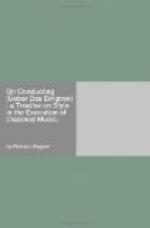To support so astounding an assertion I will take a popular example:—Has not every German heard the overture to Der Freyschutz over and over again? I have been told of sundry persons who were surprised to find how frequently they had listened to this wonderful musical poem, without having been shocked when it was rendered in the most trivial manner; these persons were among the audience of a concert given at Vienna in 1864, when I was invited to conduct the overture. At the rehearsal it came to pass that the orchestra of the imperial opera (certainly one of the finest orchestras in existence), were surprised at my demands regarding the execution of this piece. It appeared at once that the Adagio of the introduction had habitually been taken as a pleasant Andante in the tempo of the “Alphorn,” [Footnote: A sentimental song by Proch.] or some such comfortable composition. That this was not “Viennese tradition” only, but had come to be the universal practice, I had already learnt at Dresden—where Weber himself had conducted his work. When I had a chance to conduct Der Freyschutz at Dresden— eighteen years after Weber’s death—I ventured to set aside the slovenly manner of execution which had prevailed under Reissiger, my senior colleague. I simply took the tempo of the introduction to the overture as I felt it; whereupon a veteran member of the orchestra, the old violoncellist Dotzauer, turned towards me and said seriously: “Yes, this is the way Weber himself took it; I now hear it again correctly for the first time.” Weber’s widow, who still resided at Dresden, became touchingly solicitous for my welfare in the position of Capellmeister. She trusted that my sympathy with her deceased husband’s music would bring about correct performances of his works, for which she had no longer dared to hope. The recollection of this flattering testimony has frequently cheered and encouraged me. At Vienna I was bold enough to insist upon a proper performance. The orchestra actually studied the too-well-known overture anew. Discreetly led by R. Lewi, the Cornists entirely changed the tone of the soft woodnotes in the introduction, which they had been accustomed to play as a pompous show piece. The magic perfume of the melody for the horns was now shed over the pianissimo indicated in the score for the strings. Once only (also as indicated) the power of their tone rose to a mezzoforte and was then gradually lost again without the customary sforzando, in the delicately inflected
The Violoncellos similarly reduced the usual heavy accent, which was now heard above the tremolo of the violins like the delicate sigh it is intended to be, and which finally gave to the fortissimo that follows the crescendo that air of desperation which properly belongs to it. Having restored the mysterious dignity of the introductory Adagio, I allowed the wild movement of the Allegro to run its passionate course, without regard to the quieter expression, which the soft second theme demands; for I knew that I should be able sufficiently to slacken the pace at the right moment, so that the proper movement for this theme might be reached.




